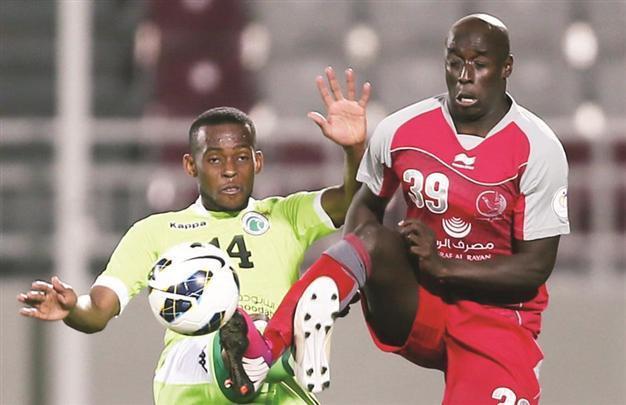Candidates to manage Asian football promise little hope
James M. Dorsey ISTANBUL - Hürriyet Daily News

Qatar’s Lekhwiya player Issiar Dia (R) challenges Sami Al Hamadi (L) of UAE’s Al-Shabab club during their AFC Champions League football match in the Qatari capital Doha. AFP photo
The line-up of contenders for the presidency of the Asian Football Confederation (AFC) promises anything but the winds of reform and change the group badly needs, after almost two years of controversy and scandal that are still reverberating through the world of football.
The list of contenders so far reads like of cast of characters from a B-movie. In many ways, the line-up reflects a scandal-ridden world of questionable governance in global soccer, in which officials project themselves as proponents of change – albeit a change that does not fundamentally rock their comfortable boat.
The 46-member AFC is scheduled to elect its new president at an extraordinary congress on May 2, following the banning for life from involvement in professional soccer late last year by world soccer body FIFA of Mohammed Bin Hammam, the AFC’s most recent elected head.
Three of the five contenders - Yousef al-Serkal of the United Arab Emirates, Worawi Makdudi of Thailand and Hafez al-Medlej of Saudi Arabia - are all associates of Mr. Bin Hammam. The Qatari national was accused of multiple conflicts of interest and financial mismanagement of the AFC.
Mr. Makdudi has repeatedly been investigated for corruption. He denied last September fraud allegations made by a South Korean firm related to the cancelation of a multi-million-dollar broadcast rights deal. Earlier, he was accused by former English Football Association chairman Lord David Triesman of involvement in an alleged scheme to buy votes for England’s failed 2018 World Cup bid.
Makdudi was cleared in 2011 of accusations that funds meant for the Thai association to build facilities were instead spent on buildings on land he owned in Bangkok. Most recently, the Thai parliament investigated FIFA’s refusal to approve a new “futsal” facility by his association.
Mr. Serkal’s hiring last year of two former AFC employees associated with Mr. Bin Hammam’s (controversial at best) financial management of the AFC holds out little promise for a real break with the past. As head of the AFC marketing committee, Mr. Al Medlej was not only a Bin Hammam associate but also involved in a $1 billion commercial rights agreement with Singapore-based World Sport Group (WSG) that was questioned by an internal audit of the group conducted by PricewaterhouseCoopers (PwC). PwC raised questions about the propriety of the negotiation of the agreement as well as its terms and advised the AFC to explore the possibility of renegotiating or cancelling the deal.
Personal battleThe fourth candidate, Sheikh Salman bin Ebrahim Al Khalifa, head of the Bahrain Football Association, was narrowly defeated four years ago by Mr. Bin Hammam in his bid for a seat on the FIFA executive committee. World Football Insider characterized the bitter battle between the two men as dominated by personal attacks and cash bribes for votes.
Sheikh Salman’s candidacy is further clouded by the fact that he is a member of the Bahrain royal family that brutally suppressed a popular uprising in 2011, in which scores of sports people - including three members of the country’s national soccer team - were arrested for supporting the protests. Some, including players, asserted that they were tortured in prison. In an interview with The Associated Press last week, Sheikh Salman conceded that “people will talk about what happened.”
the five candidates, Acting AFC chairman Zhang Jilong is the only one who has sought to introduce a degree of change within the AFC. Critics say Mr. Zhang was restricted in his ability to challenge Mr. Bin Hammam’s influence, even after he was first suspended in the early summer of 2011 because of the fact that he had headed the AFC’s finance committee during the Qatari national’s presidency.
Sheikh Salman has drafted a seven-point program entitled United for Change, according to World Football Insider, which pledges to fight match-fixing, doping and illegal betting, ensure full financial transparency by introducing international accounting standards and externally audited yearly reports, and also guarantee equality in the distribution of AFC commercial revenues.
The new president will chair an existing executive committee. One litmus test, with most candidates likely to promise financial transparency, will be whether the new president acts on the PwC recommendations, or at least initiates a thorough investigation of the group’s finances and commercial dealings. That would involve revisiting the WSG contract that, according to PwC, may have been undervalued. PwC stopped short of drawing conclusions about the propriety of the agreement, but did suggest there were grounds for a review including payments to Mr. Bin Hammam totaling $14 million by a WSG shareholder in the run-up to the signing of the contract.
Sources say pressure on the new president to follow through is compounded by continued inquiries into Mr. Bin Hammam’s management of the AFC by FIFA ethics investigator Michael J. Garcia.
